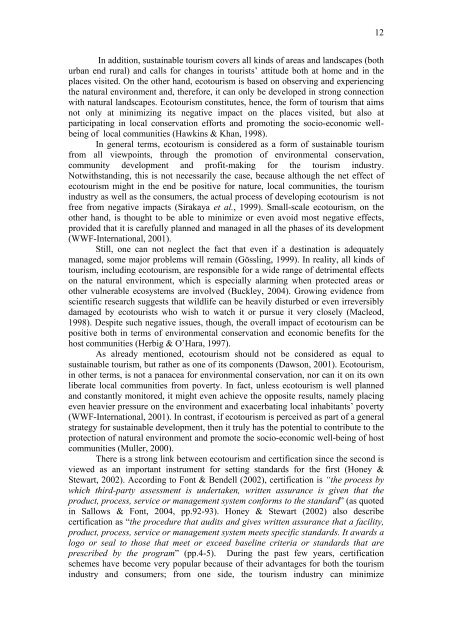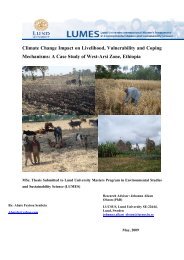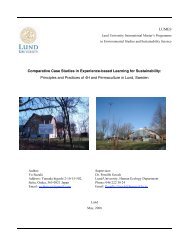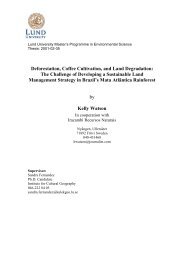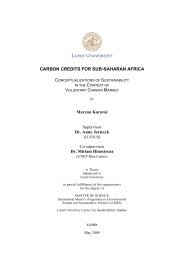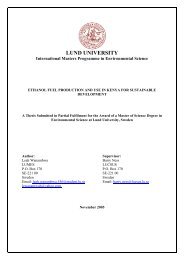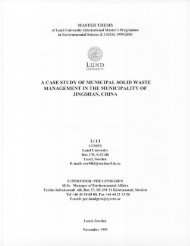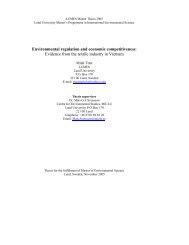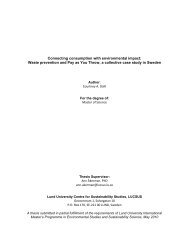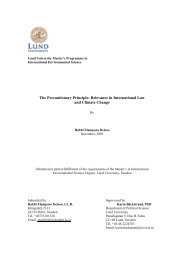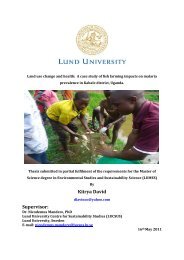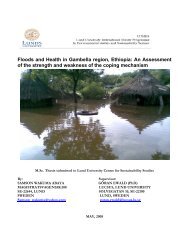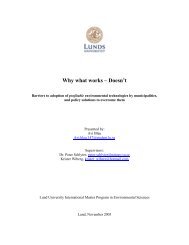Thesis title: âThe development of community-based ecotourism - lumes
Thesis title: âThe development of community-based ecotourism - lumes
Thesis title: âThe development of community-based ecotourism - lumes
You also want an ePaper? Increase the reach of your titles
YUMPU automatically turns print PDFs into web optimized ePapers that Google loves.
In addition, sustainable tourism covers all kinds <strong>of</strong> areas and landscapes (bothurban end rural) and calls for changes in tourists’ attitude both at home and in theplaces visited. On the other hand, <strong>ecotourism</strong> is <strong>based</strong> on observing and experiencingthe natural environment and, therefore, it can only be developed in strong connectionwith natural landscapes. Ecotourism constitutes, hence, the form <strong>of</strong> tourism that aimsnot only at minimizing its negative impact on the places visited, but also atparticipating in local conservation efforts and promoting the socio-economic wellbeing<strong>of</strong> local communities (Hawkins & Khan, 1998).In general terms, <strong>ecotourism</strong> is considered as a form <strong>of</strong> sustainable tourismfrom all viewpoints, through the promotion <strong>of</strong> environmental conservation,<strong>community</strong> <strong>development</strong> and pr<strong>of</strong>it-making for the tourism industry.Notwithstanding, this is not necessarily the case, because although the net effect <strong>of</strong><strong>ecotourism</strong> might in the end be positive for nature, local communities, the tourismindustry as well as the consumers, the actual process <strong>of</strong> developing <strong>ecotourism</strong> is notfree from negative impacts (Sirakaya et al., 1999). Small-scale <strong>ecotourism</strong>, on theother hand, is thought to be able to minimize or even avoid most negative effects,provided that it is carefully planned and managed in all the phases <strong>of</strong> its <strong>development</strong>(WWF-International, 2001).Still, one can not neglect the fact that even if a destination is adequatelymanaged, some major problems will remain (Gössling, 1999). In reality, all kinds <strong>of</strong>tourism, including <strong>ecotourism</strong>, are responsible for a wide range <strong>of</strong> detrimental effectson the natural environment, which is especially alarming when protected areas orother vulnerable ecosystems are involved (Buckley, 2004). Growing evidence fromscientific research suggests that wildlife can be heavily disturbed or even irreversiblydamaged by ecotourists who wish to watch it or pursue it very closely (Macleod,1998). Despite such negative issues, though, the overall impact <strong>of</strong> <strong>ecotourism</strong> can bepositive both in terms <strong>of</strong> environmental conservation and economic benefits for thehost communities (Herbig & O’Hara, 1997).As already mentioned, <strong>ecotourism</strong> should not be considered as equal tosustainable tourism, but rather as one <strong>of</strong> its components (Dawson, 2001). Ecotourism,in other terms, is not a panacea for environmental conservation, nor can it on its ownliberate local communities from poverty. In fact, unless <strong>ecotourism</strong> is well plannedand constantly monitored, it might even achieve the opposite results, namely placingeven heavier pressure on the environment and exacerbating local inhabitants’ poverty(WWF-International, 2001). In contrast, if <strong>ecotourism</strong> is perceived as part <strong>of</strong> a generalstrategy for sustainable <strong>development</strong>, then it truly has the potential to contribute to theprotection <strong>of</strong> natural environment and promote the socio-economic well-being <strong>of</strong> hostcommunities (Muller, 2000).There is a strong link between <strong>ecotourism</strong> and certification since the second isviewed as an important instrument for setting standards for the first (Honey &Stewart, 2002). According to Font & Bendell (2002), certification is “the process bywhich third-party assessment is undertaken, written assurance is given that theproduct, process, service or management system conforms to the standard” (as quotedin Sallows & Font, 2004, pp.92-93). Honey & Stewart (2002) also describecertification as “the procedure that audits and gives written assurance that a facility,product, process, service or management system meets specific standards. It awards alogo or seal to those that meet or exceed baseline criteria or standards that areprescribed by the program” (pp.4-5). During the past few years, certificationschemes have become very popular because <strong>of</strong> their advantages for both the tourismindustry and consumers; from one side, the tourism industry can minimize12


